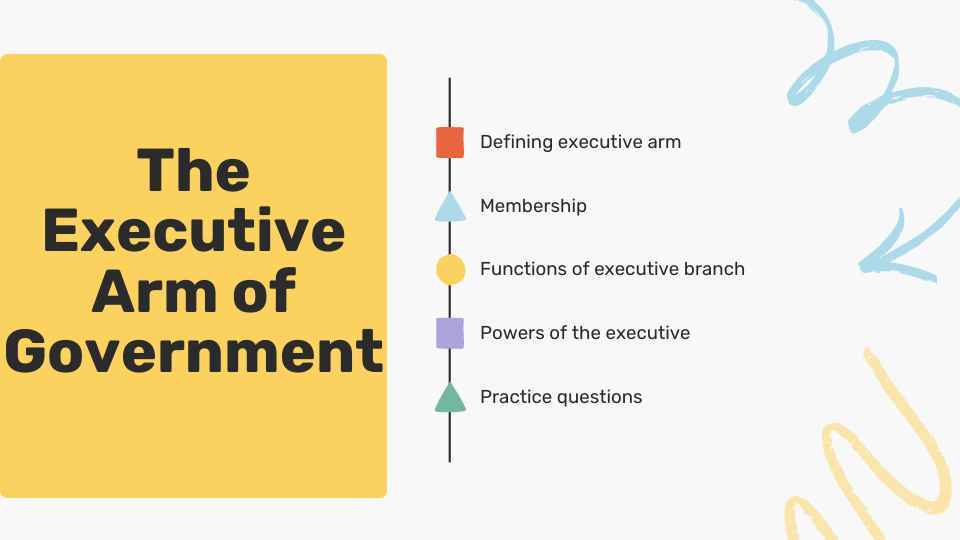What is the executive arm of government?
The executive is one of the arms of government that implement laws through the execution of laws made by the legislature. The executive is in charge of day to day administration of the government guided by the constitution and established laws of the country.
In Nigeria, for instance, the President is the head of the arm of government, which includes the Vice President, members of cabinet, and heads of government ministries, departments, and agencies at the federal level.
At the state level, the Governor is the head of the executive branch, which includes the deputy governor, members of his cabinet, and heads of state agencies and parastatals. And at the local government level, the Chairman leads the executive arm.
How does the executive work?
In countries where they practice democracy, the executive arm is in charge of governance. Under a presidential system where there is a tenet of separation of powers, the executive is responsible for enforcing and implementing laws made by the legislative branch of government.
In Nigeria, the President has the power to create some laws, such as executive orders, however such executive orders can be challenged in court. If it borders on human rights violations, the court may declare presidential executive orders illegal and unconstitutional.
The Composition
The membership of the executive depends on the system of government that a country operates. Its composition under a presidential system is different from a parliamentary system. So, we’ll focus on the membership of the executive under a presidential system.
Here are the members of executive arm:
- The President
- Vice-President
- Ministers
- Secretary to the Government of the Federation (SGF)
- The security chiefs
- Permanent Secretaries
- Head of federal agencies
- Heads of foreign missions
- High Commissioner/Ambassador
Functions of the executive arm under the presidential system
The functions of the executive goes beyond just implement the laws, here are other functions they perform to effective governance:
Foreign relation policy formulation
The executive formulate foreign policies on how the country will relate with other countries of the world. They formulate these policies in the best interest of the country.
No country succeeds in isolation because there are business, investment, and other bilateral agreements that will help better the economic fortune of the country.
The executive branch not only formulate foreign policies, it also appoints ambassadors and high commissioners as representatives that will represent the interest of their country in another country.
Directive function
The executive either at the federal or state level gives Executive Order, which is a written directive from the President of the Federal Republic of Nigeria or from a state governor, which has force of law. It may however be challenged in a court of jurisdiction.
Defence and peace functions
It is the function of the President of Nigeria to call security meetings not just when the security of the country is threatened, but by a time to time briefing from the security chiefs is important to access and find a way to consolidate on the gains or find solutions if there are loopholes in security architecture.
It is also part of the function of the president to watch out for threats that could jeopardise the internal peace of his country.
He is the Commander-in-Chief and can direct the military to take action against moves by external enemies threatening the territorial integrity of the country.
The executive also signs a peace pact on behalf of the country with another country.
Cabinet appointment
The executive (president) scouts and appoints persons into his cabinet. The cabinet members are members of the Federal Executive Council (FEC) in Nigeria. As earlier pointed out, appointees of the president are subject to the approval of the legislative arm (National Assembly).
Fiscal policy function
The executives are responsible for preparing the budget, which contains the expenditure of a country, usually within a year. The executive do not only draft the budget, they also see to its implementation as stated in the budget.
In Nigeria, for instance, heads of agencies are usually invited to defend their budget before the lawmakers (legislature). income generation and expenditure and modes of implementation are clearly stated in the budget.
Prerogative of mercy
The executive both at the federal and state levels in Nigeria (president and the governor) can grant pardon and amnesty to convicted persons or criminals after consultation with the Council of State and on the legal advice of the Minister of Justice and Attorney General of the Federation.
It must be noted that the prerogative of mercy is also one of the powers the president of Nigeria exercises in office.
Implementation of laws
When the legislative branch makes laws such as education loans, the executive arm deploys their personnel for the implementation of such laws.
Powers of the executive
Executive orders:
In Nigeria, the President has the power to create some laws, such as executive orders, however such executive orders can be challenged in court. If it borders on human rights violations, the court may declare presidential executive orders illegal and unconstitutional.
Powers to appoint:
As the Commander-in-Chief of the Armed Forces, Nigeria’s president, as the head of the executive branch, has the power to appoint heads of security agencies, including the chief of defence, army, airforce, navy, state security service etc.
Power to declare war:
Even with its powers to declare war, yet the president cannot wake up and declare war on another country without the resolution of the both Houses of the National Assembly, depending on the types of legislature.
Expenditure:
In terms of spending, the president has the power to spend in the interest of the general interest of the country. The executive does this through a budget.
The budget covering the fiscal year or any supplementary budget must be scrutinised by the legislative arm. The legislature ensures that spending of the executive is judicious and for the public interest.
Borrowing:
The president can seek credit facilities from international funding and lending organisations such as the World Bank, International Monetary Fund (IMF), for critical projects. The executive cannot do this without the approval of the National Assembly (Nigeria) or Congress (in the United States).
Cabinet reshuffle:
The president has the power to post any member of his cabinet from one ministry to the other, where he believes the minister can effectively help deliver his campaign promises.
Prerogative of mercy:
Power to pardon convicted persons, forgive and grant amnesty to criminals as Nigeria is currently seeing in the Northwest, where the country is granting amnesty to terrorists who voluntarily surrender to the military.
Limitations
Although he has the power to appoint, these appointments are subject to the scrutiny and approval of the legislative arm (the National Assembly). The same applies in other democratic countries. The powers of the executive is not absolute.
Even as the executive power includes the execution and enforcement of federal law and the responsibility to appoint federal executive, diplomatic, regulatory, and judicial officers, these appointments are subject to approval of the lawmakers.
Summary
In countries where they practice democracy, the executive arm is in charge of governance. Under a presidential system where there is a tenet of separation of powers, the executive is responsible for enforcing and implementing laws made by the legislative branch of government.
Practice questions:
- List and explain the functions of executive arm of government under the presidential system.
- What are the powers the executive arm in Nigeria.
- Is the power of the executive absolute? Support your answer with valid points and examples.
Join EdubaseNG WhatsApp Channel to get the latest education & student loan tips
Join our Telegram Channel to get the latest news about Student Loans & Education News.
Are you a stakeholder in education? You can become our guest writer. Write to us using our our email address here




